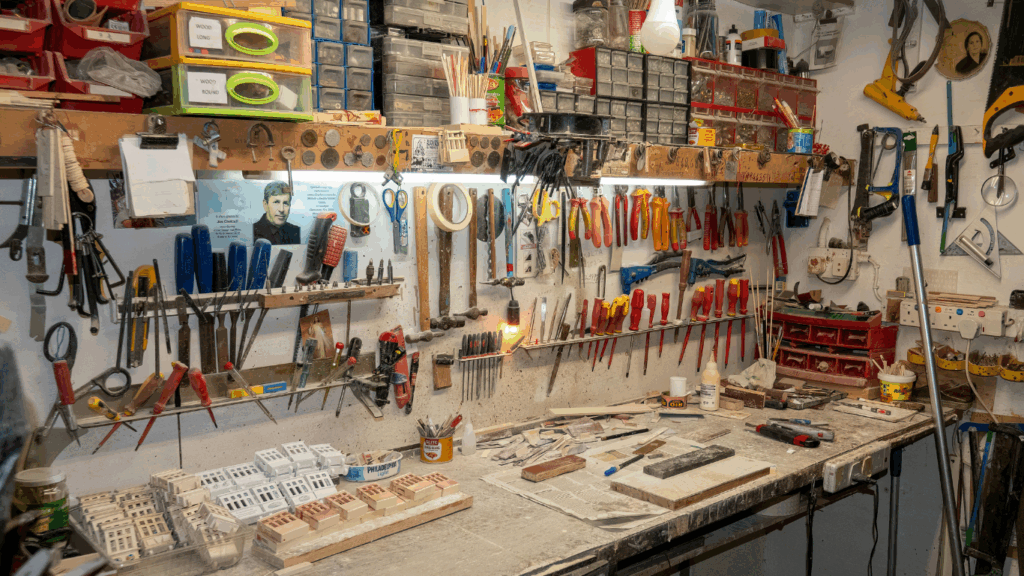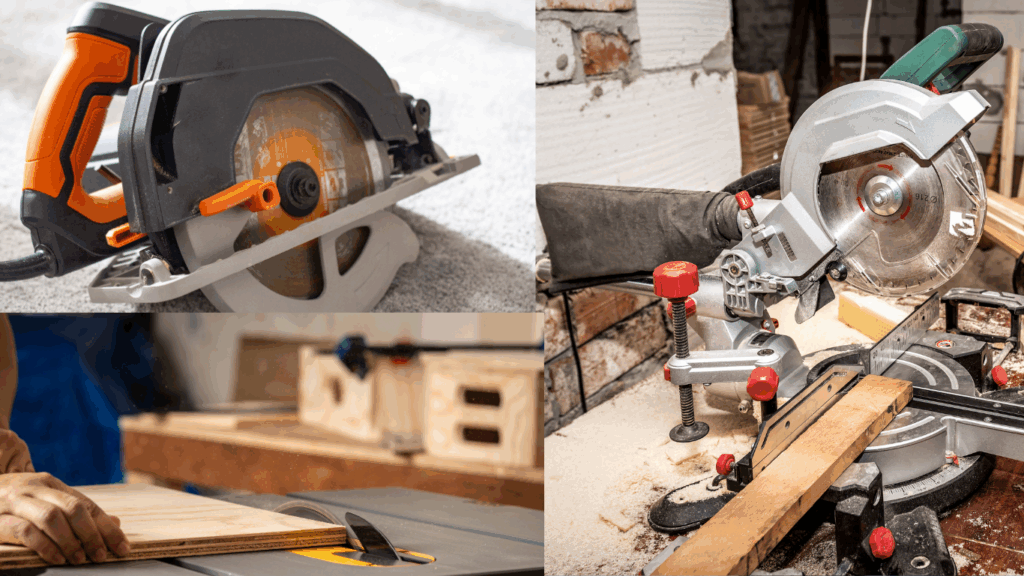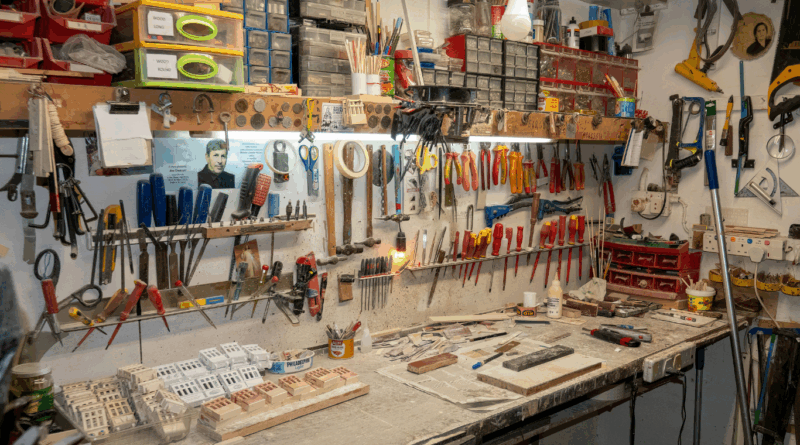Best Woodworking Tools for Small Spaces (Dad’s Garage Edition)
If your workshop looks more like a corner of the garage than a Pinterest-ready woodshop, you’re not alone.
A lot of us are out here making sawdust between bikes, holiday decorations, the car, and whatever the kids’ latest project is. But here’s the good news: you don’t need a sprawling shop to create great work. With a few smart tool choices and clever organization, you can build just about anything from a compact setup.
So grab your coffee (and maybe move that soccer ball out of the way), and let’s talk about the best woodworking tools for small spaces and how to make the most of every square foot you have.
1. The Workbench: Foldable or Wall-Mounted Is King

A good workbench is the heart of any workshop, but when space is tight, it needs to do double duty. Look for a foldable workbench or one that mounts to the wall and folds down when not in use.
If you want to get creative (and save some cash), build your own! A simple plywood top with locking hinges can attach to the wall studs. Add a few storage bins underneath, and you’ve got a functional workspace that disappears when you need to park the car.
There are also plans you can get for free on several sites, including this simple build.
Pro Tip: Add locking casters to any bench or table. Being able to roll tools out of the way instantly doubles your usable area.
2. The Multi-Tool Mindset: Choose Versatility Over Size
When every inch counts, tools that can multitask earn their keep.
Here are some top compact, do-it-all options:
- Oscillating Multi-Tool: Cuts, sands, and scrapes. It’s perfect for trimming edges, plunge cuts, and tight spaces. And it doesn’t take up much room to store.
- Drill/Driver Combo: Invest in a high-quality cordless drill with adjustable torque settings. You’ll use it on every project. Despite what many professionals may say, no need to break the bank on this if you don’t use it every day or weekend. Ryobi makes decent drill/driver combinations.
- Router: A small trim router or palm router can do decorative edges, joinery, and even flatten small slabs. You can also either purchase or make small sleds for them to help with flattening a rough surface.
If you’re tight on both space and budget, these three can handle 90%* of what you’ll want to build. *Percentage is not a guarantee.
3. Compact Power Saws: Big Results in Small Packages

A full-size table saw might be the dream, but for small-space woodworkers, portability is your friend.
- Track Saw or Circular Saw: With a guide track or a homemade straightedge, you can rip plywood and make clean cuts just like a table saw. In fact, for large sheets of plywood, circular saws are generally safer than a small or contractor table saw.
- Compact Miter Saw: Great for cutting boards to length and making angled cuts. Look for one that folds or has a built-in carrying handle. Many are made to be used at job sites and can attach to
- Jigsaw: Underrated, but mighty. It’s portable, precise, and great for curves, cutouts, and custom shapes. It can take the place of a bandsaw that can take up a lot more space. It’s also great for cutting out signs and lettering.
If you do lots of small projects, like cutting boards, picture frames, or kids’ toys, a benchtop bandsaw might be worth the footprint. It’s quiet, safe, and incredibly versatile.
4. Dust Collection: Keep It Clean, Keep It Compact
Sawdust spreads faster than glitter. A small shop can turn messy in minutes. With the right setup, cleanup doesn’t have to be a nightmare.
- Use a shop vac with a cyclone separator attachment (like a Dust Deputy) to keep your filters from clogging.
- Mount the vac on a rolling cart so it can follow you from tool to tool.
- Add a magnetic sweep or dustpan with a long handle for quick cleanup.
- And don’t forget your mask! You really do not want to be breathing in sawdust all day.
Bonus Tip: If you have an old furnace filter and a box fan, tape them together for a DIY air filter. It’s not pretty, but it works!
5. Smart Storage Solutions: Vertical Is Vital
In a small woodworking space, your walls should work for you.
Pegboards, magnetic strips, and French cleat systems are a lifesaver for anyone dealing with a compact space.
- Hang your hand tools in plain sight so you’re not digging for that one chisel.
- Store clamps on a vertical rack—they eat up horizontal space fast.
- Build stackable totes or drawers under your bench for off-season tools and finishes.
- For cheap storage solutions, often Harbor Freight has good deals that won’t break your bank, including off brand tool chests, magnetic strips, and so on.
Remember: every horizontal surface will collect junk, my workbench is proof. Go vertical wherever possible.
6. The Underrated Essentials
A few smaller tools make a huge difference in efficiency:
- Digital Caliper: Great for precision fitting and joinery.
- Combination Square: Don’t trust the cheap ones, accuracy here saves headaches later.
- Sharpening System: Sharp tools = better results. Compact diamond plates or water stones can fit in any drawer.
- Good Lighting: A small LED shop light or clamp light over your bench can make all the difference. Again, I don’t get kickbacks from Harbor Freight I swear, but if you want some cheap shop lights, that’s another great spot to check out.
7. Plan Your Space Like a Puzzle
Think of your workshop like a camper van, it’s all about modularity.
Ask yourself:
- Can this tool fold, hang, or roll?
- Can I use this surface for more than one thing?
- Can I move this project in and out easily?
Sketch out your layout before buying big tools. Use painter’s tape on the floor to mark footprints and flow paths. You’ll be surprised how much you can fit when you plan like a Tetris master.
8. Great Projects for Small Shops
If you’re short on space, focus on small builds with big impact:
- Cutting boards
- Jewelry boxes
- Wall shelves
- Picture frames
- Serving trays
Each teaches key techniques, like joinery, sanding, or finishing without overwhelming your setup. And you can actually finish them in a weekend (before your kids borrow your clamps for a school project or you get pulled away on yet another side quest).
9. The Mindset That Makes It Work
Small shop woodworking is a creative challenge. It forces you to think smarter, waste less, and stay organized. Many pro woodworkers started in a single-car garage or spare bedroom. What matters most isn’t square footage. It’s all about persistence, precision, and passion.
The Best Woodworking Tools for Small Spaces: Final Thoughts
With the right tools and setup, your garage can be a powerhouse of creativity. Start small, stay flexible, and invest in quality where it counts. Before long, you’ll be turning out heirloom-quality work between the lawn mower and the bikes and loving every minute of it.
Bonus Resource:
Check out LMNA Wood Rings or similar handmade makers to see what small-scale craftsmanship can become.
